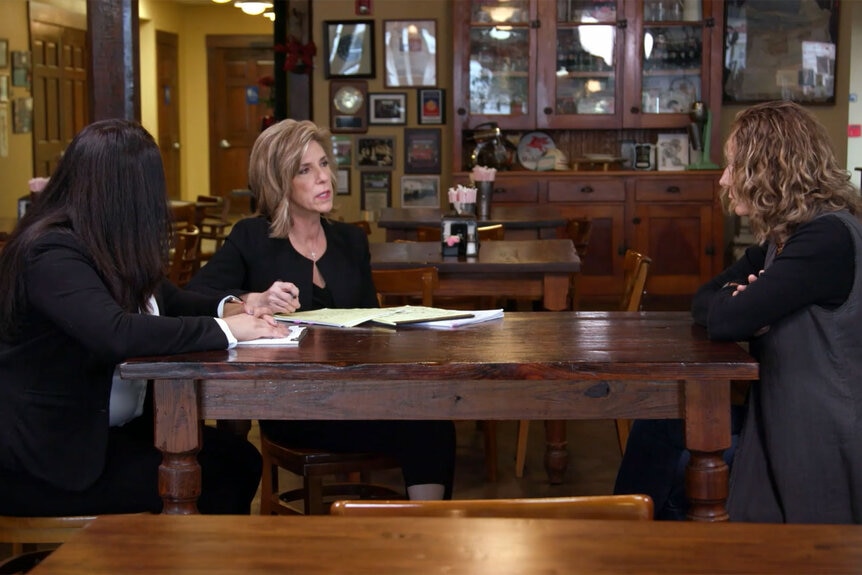Create a free profile to get unlimited access to exclusive videos, breaking news, sweepstakes, and more!
‘My Wife’s Got A Gun’: ‘Cold Justice’ Investigation Turns Up Murder Victim’s Taped Telephone Conversation
Steven Felts, a hard-working Texas family man, was shot to death in his own home in 1996. His murder remains unsolved.
In Rosenberg, Texas, Steven Felts, 36, was known as a loving family man who worked as a chemical company lab supervisor in nearby Houston. A proud and doting dad, he was well-liked in the community.
So it was all the more shocking when Steven Felts was violently beaten and murdered. On October 15, 1996, he was found at home lying face down on his couch. He had been shot three times in the back of his head. Nearly 25 years later, the case remains open.
On a recent episode of “Cold Justice,” airing Saturdays at 8/7c on Oxygen, veteran prosecutor Kelly Siegler and homicide investigator Steve Spingola head to Rosenberg to dig into Steven Felts’ brutal murder.
Working with them are Rosenberg Police Department Lt. James Murray, Det. David Murray, and Sgt. Suni Jugueta, who acknowledges there are a lot of unknowns in this cold case: no DNA evidence, no murder weapon.
Steven’s wife, Linette, “told police she found her husband dead when she returned from a trip to a fast-food restaurant,” the Houston Chronicle reported around the 10-year anniversary of the homicide. “The couple’s 6-year-old daughter was asleep in another room and unharmed.”
When Linette, a stay-at-home mom, called 911 around midnight to report the crime, she said their guns had been stolen from a case in the home. Those rifles were found in a pawn shop in nearby Fort Bend County two months after the murder.
But the killer, who had dragged Steven to a couch and covered his head with a pillow before pulling the trigger three times, was never tracked down.
Nearly 25 years later, the case remains unsolved and police have questioned Linette’s story, especially in light of evidence that her husband suspected she was cheating on him and secretly recorded her phone calls to confirm that.
Linette’s recorded conversations with other men, which authorities had possession of in the 1996 investigation, suggest there were issues in the Felts’ marriage. Linette, they learned, would disappear for days at a time.
For more personal background on the case, the “Cold Justice” team meets with the victim’s sister, Mona Felts, who has fought for justice for her brother for years.
Investigators consider Steven’s $300,000 life insurance policy that Linette was in line for as a possible motive for murder. They also consider two men prominent in Linette’s life: Alfred Hinton, who is 30 years older than Linette, is heard in a taped phone call with her, and Stacy “Big Boy” Booker, now-deceased, who worked for Hinton and was the person who pawned Felts’ guns. In 1996, Booker claimed Linette gave him the guns, but she denied that.
Siegler considers various scenarios of how the three could have committed the crime independently or working together.
Before talking to any suspects, the team reviews physical evidence. Ballistics expert Chris Robinson identifies the gun that killed Steven as an H&R Harrington revolver. “That gun is not rare or expensive,” says Spingola.
Forensic pathologist Kathryn Pinneri, M.D. reviews crime scene photos of Steven’s wounds, including the gunshots, a blunt force trauma to the back of his head, and bruising patterns on his arms. Pinneri’s observations raise more questions: Was Steven beaten to subdue him? Or was the crime personal?
Lividity -- discoloration of skin after death -- seen in crime scene photos tells Pinneri that Steven had been dead for three hours. This contradicts Linette’s claim that her husband was alive when she ran out to pick up hamburgers and dead when she returned home about 45 minutes later.
The fact that Linette didn’t check on her husband immediately, as she stated in her interview with police in 1996, casts doubt on her version of the events. “There’s a whole lot about Linette’s story that doesn’t make any sense,” says Siegler.
To shed light on the couple’s marriage, investigators talk with coworkers, relatives, and friends. Mark Sample, Steven's supervisor, had a vague recollection that Steven suspected his wife was cheating. Linette’s friends also confirm to the team that the marriage was shaky and that Steven was his wife’s source of financial support.
Days before his death, Steven had transferred a large sum of money from a joint account to his personal account. Linette claimed that was for tax purposes.
Bill Wilder, the Felts family lawyer, recalls talking to the victim about a divorce and claims Steven believed his wife was dangerous.
“A few months later, he’d been murdered,” Wilder tells “Cold Justice” investigators.
Investigators also focus on another taped conversation. In it, Steven expressed his fear about getting shot by his wife with his missing pistol. “My wife’s got a gun,” Felts said. “That’s what’s scaring me.”
Sample confirms that his voice is the other one heard in the recording, which makes the tape admissible evidence.
Furman and Spingola speak with one of Booker’s friends. He says Booker asked him to borrow a gun because he needed to “take care of some business.” Siegler and Juguetan also interview Hinton, who denies having a sexual relationship with Linette. Hinton also denies having anything to do with Felts’ murder.
Furman and Spingola confront Linette with evidence about the transfer of money, her questionable story about the crime, the phone call in which her husband expressed fear about her, and Booker’s pawning the guns. She eventually shuts the conversation down and says she needs to talk to her attorney.
The lawyer instructs her not to say another word.
After examining all the evidence, the team clears Hinton as a suspect. Booker, though deceased, remains a suspect who can never be charged. Circumstantial evidence points at Linette, they believe.
Findings from the investigation are presented to Fort Bend County prosecutors, who concur there is enough evidence to move the case forward.
While delayed due to the COVID-19 pandemic, the Fort Bend County’s DA’s office is still actively preparing this case for presentation to a grand jury, according to “Cold Justice.”
“There is no happy ending,” Mona Felts tells producers. “That possibility ended with [my brother’s] life.”
To learn more about this case, watch “Cold Justice,” airing Saturdays at 8/7c on Oxygen. You’ll find more episodes here.



































